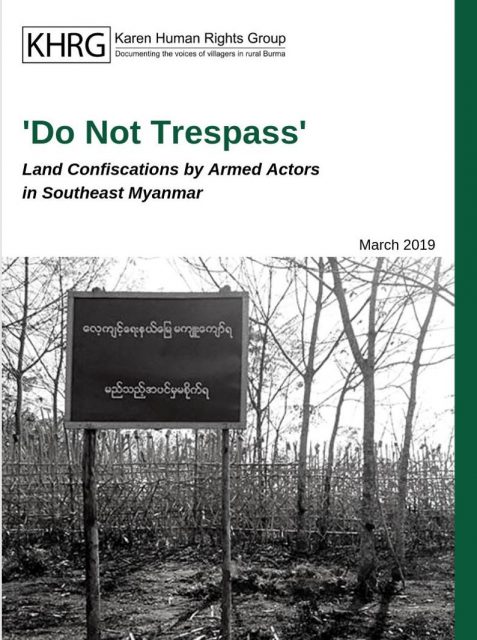“Do Not Trespass” Land Confiscation by Armed Actors in Southeast Myanmar


Introduction
“Whenever I go to my plantation, I see a sign erected by the Tatmadaw that says ‘Military land, do not trespass!”, a victim of land confiscation explains. “This makes me inconsolable. I live in fear that the Tatmadaw will permanently confiscate my land. All of our work will be in vain. Our lives will be shattered because we depend on our plantation for our livelihood.”
Long-standing conflicts have resulted in decades of widespread human rights abuses and land confiscations in Myanmar’s ethnic border areas. Both the Tatmadaw and Ethnic Armed Groups are responsible for confiscating land. In a country where 70% of the population is dependent on agriculture, land confiscations have serious, long-term consequences on the lives and livelihoods of ethnic communities. The total number of acres that were confiscated by armed actors and private companies in recent decades is unknown, but estimates are in the millions. In 2016, the Upper House’s Farmers Affairs Committee put the number at over 2 million acres of land. Estimates for military land confiscations are difficult to obtain because victims often fear retaliation by perpetrators for reporting the confiscations.
With the signing of the Nationwide Ceasefire Agreement in 2015 and the relative stabilisation of several conflict zones, rural communities assumed that land previously confiscated by armed actors would be returned to them. This expectation has not been met. When the National League for Democracy took office in March 2016, it created the ‘Central Reinvestigation Committee for Confiscated Farmlands and Other Lands’, and declared that it would solve all land confiscation cases within six months. Although the body claims to have settled thousands of claims, thousands more remain unresolved. In July 2018, Tatmadaw Colonel Zaw Min stated, “the military has been returning many acres of land – as much as it can.” Yet thousands of subsistence farmers continue to face livelihood challenges, and hundreds of communities still live in fear due to the close proximity of armed actors to their villages.
The restitution of land by armed actors to farmers is an essential step to the realisation of peace, justice and reconciliation of Myanmar. Yet, instead of taking steps to strengthen land tenure rights in ethnic minority areas, the Myanmar Parliament has recently passed amendments to the Vacant, Fallow, and Virgin Lands Management Law that could strip millions of customary farmers of their lands.
This News Bulletin explores the dynamics of military land confiscations in Southeast Myanmar. It first focuses on analysing the legal framework around land rights, to assess the extent to which it prevents or facilitates land confiscation by armed actors. The second part analyses the characteristics of land confiscation on the basis of 26 cases documented by KHRG, with a particular emphasis on the corresponding human rights violations and the negative impacts on affected communities and displaced persons. Finally, the report highlights four case studies in order to raise the voices of victims and highlight the devastating and multiple effects of land confiscation on ethnic communities.
View this report in the original site HERE.
Download full report HERE.
၎
င
၎
၎

